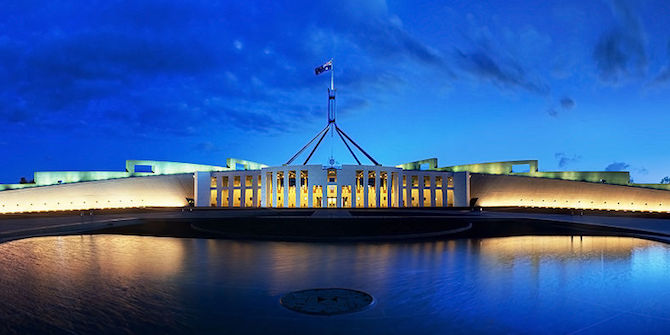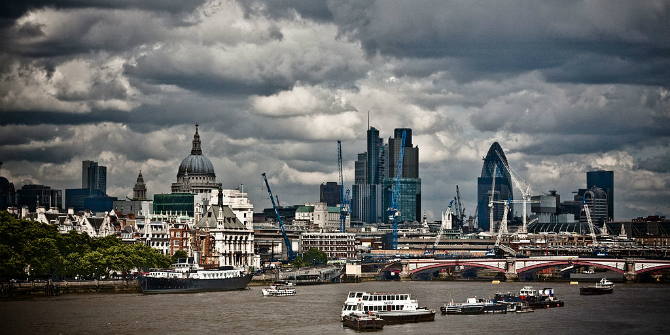 Pippa Catterall looks at the historical context of prorogation in the United Kingdom, the implications of this move for the future of British democracy, as well as for the constitution and the monarchy.
Pippa Catterall looks at the historical context of prorogation in the United Kingdom, the implications of this move for the future of British democracy, as well as for the constitution and the monarchy.
Decisions have consequences and those who are responsible for such decisions should be held to account for them. This, of course, is a major downside of referendums. There are no mechanisms to hold millions of people responsible for Brexit and its consequences. Instead, only a government that is attempting to implement the referendum verdict can be held to account, and in the British constitution the proper place to do that is in Parliament. So much for the constitutional theory: now for the politics.
The politics of how we got here is that the present Prime Minister was a member of a government which negotiated a particular arrangement for Brexit with the EU, voted for it, and then tore that up to further his political ambitions. Whatever Boris Johnson says about bluffing the EU back to the negotiating table, his failure to put forward any credible alternatives to the deal he supported and then rejected suggests that if he remains in power then Britain will leave the EU without a deal on 31 October, and that this outcome will be the responsibility alone of him and his government. As we know from the leaked Yellowhammer documents, this will have consequences for everything, from cancer patients to food supplies. These consequences will fall upon MPs’ constituents, who they have a duty to represent and, on whose behalf, they hold the government to account for its actions.
On one level this is why the prorogation which the government intends to call matters. This avoiding of parliamentary scrutiny is, however, merely a collateral effect. The prorogation, instead, has two main purposes. The minor one is that governments have always used prorogation as a matter of parliamentary tactics. This, the longest since 1930, is no exception. Now, as then, a minority government is seeking to deprive the Opposition of the only significant parliamentary weapon it has: time. The way this has been done illuminates the main purpose of this particular prorogation, which is not as a piece of parliamentary tactics, but as political theatre.
In the closed world of Westminster, this political theatre will have been gamed over the long summer recess during which the opposition parties often appeared hopelessly divided on tactics. One possible scenario, though one which has receded, is to keep them divided by depriving them of time to disrupt and scrutinise the government. Another is that they overreach themselves, either in Parliament or by becoming too associated with the protests that the prorogation announcement has unleashed, particularly if those protests should turn into civil disobedience or violence.
Any of these scenarios would play well for the government with a rather more important audience for their coup de théâtre, which is those Tory MPs tempted to vote with the opposition in order to frustrate No Deal. The government was well aware that if this happened then it might either lose office or control of the agenda. The announcement of the prorogation seized the initiative and signified to would-be rebels what the government was prepared to do to get its version of Brexit over the line. This message was then reinforced by the threat of deselection and by the Prime Minister’s anti-Corbyn newspaper screeds over the weekend. This was all designed to distract from the consequences of No Deal by concentrating would-be rebels’ minds instead on the consequences for them. For this unelected Prime Minister, it also has the happy effect of turning the debate, he hopes, from one about avoiding No Deal to one about avoiding his replacement by another unelected Prime Minister in the shape of Corbyn the ‘bogeyman’.
In seeking to set up the debate in this way, the government are well aware of Corbyn’s dire poll ratings in large swathes of the most important audience, the British public, which their political theatre is designed to reach. For the prorogation announcement immediately distracted from the consequences of No Deal, that are anyway still abstract in the minds of much of the public. It also manoeuvred the opposition into defending parliamentary democracy. However, among the parts of the public the government is trying to mobilise, Parliament is widely seen as attempting to frustrate the 2016 referendum decision. Setting up the debate as Parliament versus the People is the best possible scenario from the government’s point of view in terms of hardening its vote and dragooning as many as possible of Farage’s supporters into the Tory camp.
This, of course, makes most sense only if the election for which the government has obviously been preparing all summer actually happens. Their problem is that under the Fixed Term Parliament Act they need the opposition to vote for this as well. Not only is the planned prorogation suspiciously similar in length to an election campaign, but its timing is clearly designed to push the opposition towards voting early for the dissolution of Parliament and an election fought on ground the government’s choosing.
So, the prorogation is a sly tactical device being used as political theatre. Yet the issues it raises about the way in which British democracy works have consequences much more serious than the mere corralling of voters into the entrenched camps it is designed to achieve. Ironically, one aspect of this is the role of the monarchy. If it were not for the Brexit factor it would be clear that this is an example, not of the People versus Parliament, but of the Crown versus Parliament, for prorogation is fundamentally about using Crown prerogative to avoid parliamentary scrutiny of the executive. During the present reign, prorogation has been repeatedly abused in this way in some of Her Majesty’s other realms, notably under Stephen Harper in Canada. There is a risk that a similar process of normalisation could happen in the United Kingdom, ultimately drawing the monarch herself into political controversy.
The difference in the present scenario is that the government claims their legitimation comes not from the Crown but the People. The prorogation thus reinforces a trend already developing before 2016, whereby voters have increasingly seen democracy in Britain not as parliamentary or direct, but as delegatory. The concept of delegatory democracy in Britain has a lineage dating back at least to the Chartists of the 1830s and 1840s. However, whereas they envisaged Parliament as delegates, what has happened since 2016 is instead that the government has presented itself as the delegate, with plenipotentiary powers to interpret the ‘Will of the People’. Instead of bolstering Parliament against the executive, as the Chartists intended, the contemporary version of delegatory democracy has thus instead strengthened government against Parliament.
That a government can simultaneously abuse the uncodified powers of the Crown to avoid parliamentary scrutiny, and invoke the delegatory democracy of its selective use of referendums to ram through its own interpretation of their results, raises the risk that what we are seeing is the start of the British polity morphing into what Karen Scheppele has called a ‘Frankenstate’. This is a country whose government looks like it plays by the rules, but stretches them and uses every trick in the book to ensure that neither democracy nor the Rule of Law actually exist in practice. Scheppele coined the term to describe Victor Orban’s Hungary. Worryingly, this Frankenstate does seem to be admired by many Tories. However, there are lots of variations on the Frankenstate model in the Commonwealth as well, where constitutional order has been bent or parliament suborned. Frankenstates, as Orban has demonstrated, are not made in a single coup. Instead, there is a gradual process of change and whittling away of accountability, with the invocation of ‘enemies within’ whether opposition leaders or immigrants, in order to justify it. Both the manner of the prorogation, and the rhetoric surrounding it, are redolent of such tactics. Without accountability, however, there can be no democracy, which would certainly set Britain on the road towards becoming a ‘Frankenstate’.
_____________
 Pippa Catterall is Professor of History and Policy at the University of Westminster and Visiting Lecturer in Public Policy and Politics for the Hansard Society.
Pippa Catterall is Professor of History and Policy at the University of Westminster and Visiting Lecturer in Public Policy and Politics for the Hansard Society.
All articles posted on this blog give the views of the author(s), and not the position of LSE British Politics and Policy, nor of the London School of Economics and Political Science. Featured image credit: Pixabay (Public Domain).







